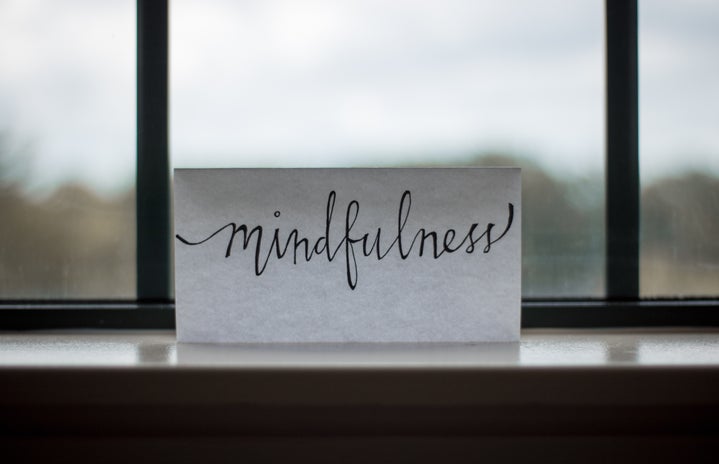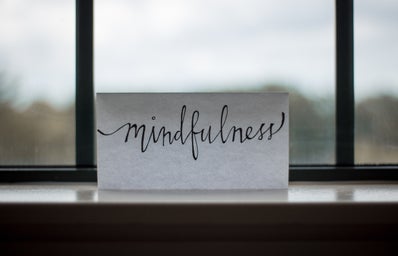As students are wrapping up midterms and gearing up for finals and graduation season, it’s easy to get caught up in the whirlwind of long days and late nights, letting days or even weeks pass by in the blink of an eye. If you’ve ever asked yourself, “where did the time go?”, you might benefit from incorporating mindfulness practices in your daily life.
Mindfulness is essentially a state of active, conscious awareness of what’s occurring to you and around you in real-time. Along with this acknowledgment, those practicing mindfulness are encouraged to acknowledge and accept their emotions, bodily sensations, and thoughts – limiting judgment if they’re “good” or “bad” feelings, sensations, or thoughts to be having. I’ve been on a bit of a mindfulness journey myself over the past few years since realizing that my default level of operating is staying busy; I don’t have time to contemplate or experience intrusive thoughts. Prioritizing listening to my mind and body during long school/work days has helped me function more healthy and sustainable. It has significantly decreased my experiences of burnout! Here are a few ways I practice mindfulness in my daily life.
Focused Breathing
I try to take a minute or two each morning to sit (or lay) in silence, listen to the rhythm of my breath, and focus on how my body feels in each breath. I’ve found that beginning with this small gesture relaxes my mind and helps me start my day off on the right foot. When I catch myself getting worked up and starting to breathe more heavily and rapidly throughout the day, I return to this exercise and purposefully work to slow down and continue mindful breathing until my breath is back to its average pace.
5-4-3-2-1- Method
This method is a commonly recommended anxiety reduction technique that incorporates mindfulness of all five senses. When experiencing a moment of overwhelming anxiety, you’re encouraged to acknowledge the following things (either in your head or out loud): 5 things you can see, four things you can touch/feel, three things you can hear, two things you can smell, and one thing you can taste. This grounding method forces your acknowledgment of your surroundings and provides you a moment to exist and take in the world around you.
Avoid Multitasking
While multitasking is sometimes necessary when taking notes and simultaneously listening to your professor’s lecture on Zoom, it inhibits you from giving full attention to a specific task. You’re never genuinely doing two (or more) things at once, and your brain is just switching attention between tasks so quickly that you don’t even notice. Focusing on one thing at a time will allow you to be more effective in your work and ultimately save you the stress and cognitive overload of multitasking.
Mindful Journaling
I’ve never been the best, most consistent journaler, but I enjoy some stream of consciousness writing every once in a while. Mindful journaling can mean many things, but for me, it usually consists of writing or typing out all of my current thoughts, anxieties, and emotions. There are some great mindfulness journals out there with pre-written prompts to focus on, which some people find helpful too! Either way, the goal is to get all of your thoughts down on paper so you can acknowledge them and then move on with your day.
Fuel Your Body
I constantly find myself throwing together quick dishes and eating snacks throughout the day while working instead of taking the time to make a meal. Carving out just thirty minutes to make something you know you’ll enjoy eating and that will fuel your body with all of the proper nutrients you need makes a world of difference. Mindful eating is also a popular practice, but I don’t have experience with that myself. Many other Her Campus writers at NYU and beyond have written on this topic, though, so check those articles out if you’re interested.
Respect Your Boundaries
Whether they be relationship boundaries with friends/family, work boundaries with your “available” hours, or other personal boundaries you’ve set – make sure to acknowledge and adhere to them as best you can! When you feel yourself reaching the outer bounds of comfortability, take a step back and ensure you’re functioning within your limits.
Appreciate Small Victories
Some days will have a greater “quantity” or “quality” of achievement than others. Sometimes it’s not celebrating a job acceptance or an A on an exam, but rather cleaning up your email inbox or an enjoyable meeting with your work supervisor. Treating yourself and acknowledging hard work, no matter how minuscule your accomplishments might seem to you, will keep you going and is yet another way to practice mindfulness of positive experiences!
Unplug
This part is difficult as we’re all largely interacting online with our friends and family during COVID. However, putting your phone and laptop away for even an hour can serve as a mental reset and allow for some uninterrupted self-reflection time. Being alone with just your thoughts and no phone to distract you can be scary at first, but ultimately it can be beneficial to your mental health! Cleaning your room, listening to music, or taking a shower are just some of the “unplugged” activities that can serve as mini-breaks in your tech-filled days.
Acknowledge Emotions
Embrace the good, the bad, and the scary. This past year I’ve found myself burying negative emotions of sadness, grief, and general uneasiness more than ever, forcing them into the subconscious of my brain and moving on with my day. Mindfulness consists of acknowledging ALL emotions, even when it’s hard to do so. Once you’ve identified these emotions, you briefly think about why you’re experiencing them before finally accepting and validating them. Ignoring feelings might feel good at the moment but can lead to an even more overwhelming response in the future. *This is a VERY condensed version of mindfulness – there’s tons of great resources online that go deeper into this*
Embrace Imperfection
As I’ve said before in this article and others I’ve written, things like self-care, self-love, and mindfulness are entirely different from person to person. There is no one-size-fits-all approach to incorporating mindfulness into your life, and sometimes you will go through techniques that don’t work for you. Similarly to acknowledging emotions, you must also embrace your mindfulness journey’s imperfect parts, knowing that everything you’re doing is valid and okay!
—
The end of the year, especially for seniors and graduating students, can be filled with a lot of anxiety and uncertainty. Now, more than ever, it is essential to take care of yourself and listen to your mind and body! Making small steps to incorporate mindfulness into your daily routine helps you become more in touch with yourself and the world around you. If the past year has taught me anything, it is to be present at the moment when you can because you never know when things can change and completely change your ways of living. Mindfulness is just one way to do this.



